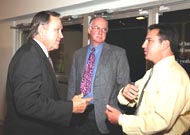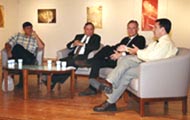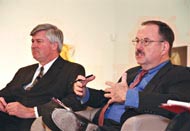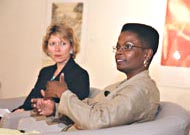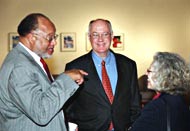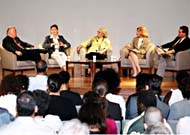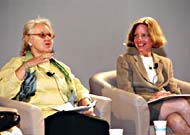



![]()
As the nation prepares for the Presidential debates in Fall 2004, the University of Miami will host events that explore locally oriented issues of national importance. This Community Forum Series is designed to bring students, residents, experts, activists and local officials together in a jargon free and approachable manner. The theme of the series will address a variety of often overlooked topics in understanding the state of democracy in contemporary Miami and how we all can work together to improve the quality of life for area residents.
Location: Wesley Center, 1210 Stanford Drive (Main Entrance off Ponce de Leon Blvd)
Free parking will be located close by at the Pavia Garage, 5615 Pavia St (Ponce to Stanford Drive, first left on Merrick, quick left onto Pavia)
March 1: 7 - 9 P.M.
Dumb and Dumber?
The Challenge of Local News and Public Education
| Panelists: Michael Putney, Channel 10 reporter, Miami-Herald columnist Merritt Stierheim, Superintendent, Miami-Dade County Public Schools Tony Doris, reporter, Palm Beach Post, formerly with the Miami Daily Business Review Prof. Walter Secada, UM Professor of Education How effective are local newspapers and TV stations in presenting complex social, economic and political issues? What pressures are they under to dummy down the news? Why does sensationalism seem to dominate the news? What alternative sources of news exist that can provide more effective coverage of local issues? What are students learning about political culture, international economics, or social change in schools? Do teachers have enough resources to inform students about current events? How visually literate are students in questioning what they see on television news?
|
|
March 29: 7 - 9 P.M.
Up From Cynicism:
Politics, Campaign Finance, and Civic Activism in Miami-Dade County
| Panelists: Katy Sorenson (County Commissioner) Robert Sechen, General Counsel, Republican Party of Florida Thomasina Williams, Esq. Ric Katz (political consultant, Communikatz) Is there widespread political apathy in our region? Is it more marked here than elsewhere? How effective are local advocacy groups in getting people to speak out? How can local political parties attract public attention? How does the campaign finance system relate to the cynicism? Who spends the most money in buying influence? Who are the main local power brokers? Is the distance of Miami from Tallahassee responsible for a lack of attention on state issues? In what ways does South Florida’s system of campaign finance mirror national concerns? In what ways is the fragmentation of political authority responsible for the alleged apathy?
|
|
April 12: 7 - 9 P.M.
Getting BeYond Getting Along:
Facing the Diversity of Miami-Dade’s Ethical Traditions
| Joe Garcia, Exec. Dir., Cuban American National Foundation Leonie Hermantin, Strategic Planning Director, Santla Haitian Neighborhood Center, resident of South Miami Ken Goodman, UM, Ethicist Cheryl Little, Florida Immigrant Advocacy Center What are the major demographic trends in Miami-Dade? Who votes and why? What is the level of anger between different ethnic groups in Miami and how has it improved or gotten worse since the Elian Gonzalez incident? What was the impact of the election of 2000 in discouraging voters? How can the diversity of our regions ethical traditions be best understood? What media help bring the greatest understanding of the diversity of people in our region? How have local leaders acted to help or hurt greater understanding between people? In what was is class as important a consideration as ethnicity in understanding local politics?
|
|
May 24: 7 - 9 P.M.
Planning and the Public Voice:
Charrettes, Democracy and the Growth Management Process
| Elizabeth Plater-Zyberk, Dean of the UM School of Architecture Maria Anderson, Commissioner, Coral Gables Beth Dunlop, Architecture writer, The Miami Herald George Burgess, County Manager How effective are public meetings at eliciting the public voice? How respectful of the public are politicians? What is a charrette and how widely used have they been in this area? In what ways are charrettes a new form of democracy? Do they really represent local opinion and choice ? How can they be improved? Is it the case that local and state laws regarding growth management so complex that so few people get involved unless issues are in their backyard? How can the system be improved?
|
|
Sponsors: The College of Arts and Sciences, the Institute for Public History, the League of Women Voters and the Urban Environment League.
Organization: Each evening program will begin with light refreshments from 7 to 7:30 followed by an opening set piece defining the questions at hand, brief presentations and dialogue among panelists and end with questions from the audience. The program will last from 7:30 to 9. Professor Gregory Bush, Director of UM's Institute for Public History will be the series moderator.
The Wider Audience: Presentations will be videotaped and offered to UM and other local cable stations. Transcripts, and streaming video of the proceedings will be placed on a university website for additional ongoing community dialogue. The website can be located at: http://scholar.library.miami.edu/community_forum/
For further information, contact Gregory Bush at 305-284-6404 or email: gbush@miami.edu
Prepared 2/16/2004
